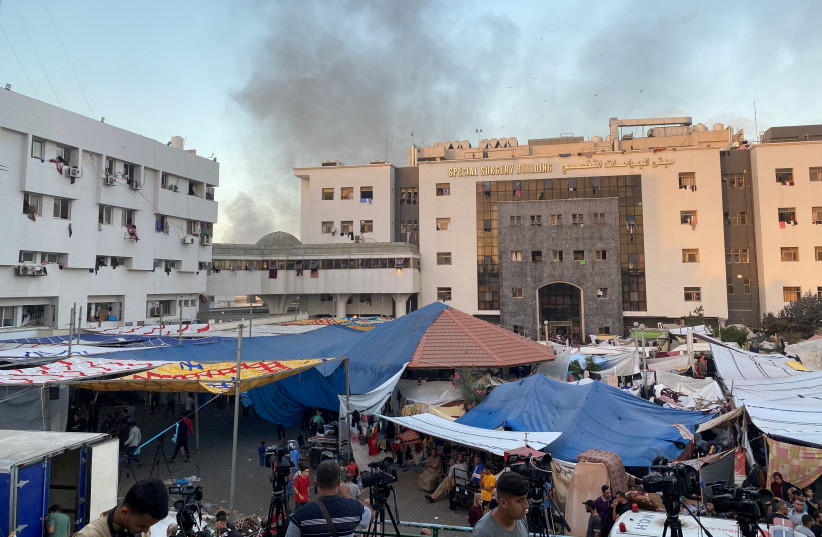Gaza City Shifa Hospital Director Muhammad Abu Salmiya recently had a hearing before an unidentified Israeli civilian Magistrate's Court via videoconference in which his detention was extended, sources have told the Jerusalem Post.
Abu Salmiya is being criminally probed by the Shin Bet (Israel Security Agency) under current war emergency regulations relating to Hamas and other terrorists connected to the war.
As part of those regulations, Abu Salmiya is also still unusually being prevented from meeting with a lawyer.
Though sources did not identify the civilian court, traditionally, the Beersheba courts have handled a variety of Gazan terror cases.
As of Monday, the Post had only been hinted informally by some sources that he remained in Shin Bet custody, with the IDF legal division, the Shin Bet, the Justice Ministry, and the police all declining to comment on the record.

The IDF and the Shin Bet announced his arrest on November 23, but since then have given no official update.
Under standard rules in Israeli civilian courts, the state must generally file an indictment within a certain number of days or, in exceptional circumstances, within a few weeks, in order to justify keeping a suspect in detention.
In the Israeli military courts that deal with West Bank Palestinians, the military prosecution sometimes has up to a period of months to file an indictment, during which the Shin Bet could keep someone in detention if it involves a security crime.
There is also administrative detention, which is an entirely different track, but that is usually reserved for terrorists who are expected to perpetrate violence, something Salmiya has not been accused of.
Israel also has a law for “unlawful combatants” which is being used to deal with at least 150 or more Hamas terrorists who were captured while fighting IDF forces.
It appears that Israel is applying these rules to Abu Salmiya.
Expansion on detention?
On November 28, the Palestinian-leading Middle East Monitor reported that “the Government Media Office in Gaza said yesterday evening that Israel had extended the detention of the director of Gaza’s Al-Shifa Hospital for an additional 45 days.”
No Israeli office has confirmed the specific number of days his detention was extended, but when previously questioned about the handling of other unlawful combatants arrested during the war, the IDF said, “there are terrorists who were captured in connection with the slaughter perpetrated by a terror organization and who are detained by the State of Israel. This is according to the law, whether based on [judicial] detention orders or whether based on the authority of IDF officials who have jurisdiction to order their detention. Regarding the latter category, judicial review regarding any continued detention will take place before a judge 45 days from the date of the detention order.”
Back on November 23, questioned repeatedly earlier in the morning about why he had been arrested and why no official announcement had gone out at that point, Israeli and IDF officials' responses alternated from surprise at the event to a promise that an announcement would go out soon.
However, even the 2:30 p.m. announcement on November 23 did not make any direct charges against the Shifa chief.
Rather, the announcement said that he had been arrested and brought to the Shin Bet for interrogation after significant testimony and video evidence from others that Shifa had been used as a command center for Hamas during the director's tenure.
The statement stated, "The terror group Hamas utilized many resources, including electricity in order to strengthen its tunnels which it built under the hospital. In addition, Hamas kept military items stored in the hospital and in its immediate surroundings."
In addition, the statement read that after the October 7 Hamas mass terror attack on Israel's South, the terror group "used the hospital as a refuge for its terror forces and even brought Israeli hostages to there who were kidnapped during the day of slaughter. A pathology report confirmed that soldier Noa Marciano was murdered on the grounds of Shifa Hospital."
Next, the statement said vaguely that, "a decision regarding his detention would be made in conjunction with the findings of the investigation regarding his involvement with the hospital's connection to terror."
Salmiya faces allegations of “aiding the enemy during wartime and providing service to terror organizations,” the al-Quds news network reported.
If true, Salmiya would still eventually need to be prosecuted in a special unlawful combatants proceeding or in Israeli civil or military courts.
The US generally held unlawful combatants of al Qaeda after the September 11, 2001 attacks on the Twin Towers and the Pentagon only if they were battlefield arrests, not mere conspirators or those who had aided the terror group in logistics, as Salmiya may eventually be accused of.
However, Israel’s law on unlawful combatants could be used more broadly.
There was heavy global criticism of Abu Salmiya’s arrest when it was announced.
